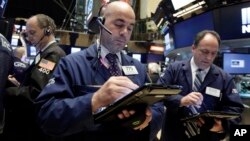The S&P 500 closed lower by a fraction of a percent on Friday for the ninth trading session in a row, the first time that has happened in 36 years, due to a decline in crude oil, interest rate hike jitters and uncertainty around the U.S. national election.
“With signs of slowing job growth and a drop in consumer confidence, the positive changes in trend we hoped for last month may have been put on hold,” Brad McMillan, chief investment officer for Commonwealth Financial Network, said. “One caveat for this month's data, though: The weakness may have more to do with the turmoil around the U.S. election than with the economy itself.”
Employment report
The Employment Situation showed that the labor market continues to tighten and push up wages, keeping the Federal Reserve on track to hike interest rates at the Federal Open Market Committee meeting on December 14.
The U.S. economy created 161,000 net new jobs in October. The unemployment rate fell to 4.9 percent, and average hourly earnings, a key gauge of wage pressures, accelerated to 2.8 percent year-over-year from 2.7 percent in September. Although the headline job count was slightly below consensus expectations of 173,000, the September reading was revised up by a whopping 35,000.
Crude oil
West Texas Intermediate futures, the world's most actively traded oil product, fell just under 10 percent as signs of tensions resurfaced between Saudi Arabia and Iran and a surge in U.S. crude inventories last week, further adding to the supply glut and depressed demand.
Election impact on the markets
An increase in stock market volatility ahead of and immediately following the national election on November 8 is starting to play out now, following last Friday's surprise with the FBI revisiting its investigation into Hillary Clinton's email.
Regardless of the outcome, several analysts do not expect a major election-related, long-term market disruption, for several reasons. Most notably, the stock market historically has performed well around elections as policy uncertainty is resolved.
"Right now everyone is laser-focused on the election, and there are other outliers investors will turn their back to, like oil prices, macro data and earnings, particularly as we come into the key holiday sales season for retailers," Joe Halpern, CEO of Exceed Investments, said. "This will start to happen as the election outcome is digested by the markets."
Holiday home stretch
The National Retail Federation expects retail sales in the U.S. for November and December (excluding autos, gas and restaurants) to increase a solid 3.6 percent to $655.8 billion. Online sales are forecast to increase 7 to 10 percent over last year to as much as $117 billion, which is 18 percent of total.
Still-low prices at the pump, low interest rates, steady overall job and wage gains, and sturdy home values are supportive, although the stock market's mixed performance over the past three months and election uncertainty may dampen consumer spending.
Analysts are now a bit more cautious on the consumer discretionary sector because of this uncertainty and skyrocketing health care costs, following the premium hikes on November 1.




